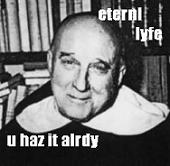Christ died once for our sins, the just for the unjust, that e might offer us to God, being put to death indeed in the flesh, but enlivened in the spirit; in which also coming he preached to those spirits which were in prison, which had formerly been incredulous when they waited for the patience of God in the days of Noah (1 Pet. 3).
Who are these ‘spirits in prison’? Not damned souls, since Christ has nothing to say to them; He ‘knows them not’. Also, the context in which St Peter mentions these spirits is that of Christ’s work of reconciliation.
Nor, pace Cornelius a Lapide, do I think they are the just in Abraham’s bosom who were ready, as soon as our Lord descended to the world below, to receive eternal bliss. For if St Peter had wanted to mention such souls, or a sub-set of such souls, why would he have defined them as those who were ‘incredulous’ or ‘disobedient’ in the days of Noah? For the characteristic of the souls in Abraham’s bosom was that they were prevented from entering paradise simply by original sin, the debt of which had not yet been paid, and not by personal sins.
The most natural reading of St Peter’s words is that he is thinking of souls in purgatory. This was the only group of souls that both could be preached to and also was in prison on account of personal sins. If he mentions those who had sinned in the days of Noah – but, presumably repented when the flood waters actually appeared on the horizon – this is perhaps to emphasise both the justice and mercy of God. Justice, as they had been in purgatory so long. Mercy, as even some of those who lived when all flesh had corrupted its way upon earth, and who laughed at God’s calls to repentance, were yet saved before the end.


